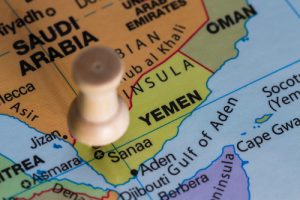
U.S. Sen. Todd Young (R-IN) wants to withhold United States funding if the Saudi Arabian government refuses to engage in “good faith” negotiations to end the civil war in Yemen, where the resulting humanitarian crisis has become the worst in the world, according to three United Nations’ (UN) agencies.
In the bipartisan Senate Joint Resolution 55 (S.J. Res. 55) that Sen. Young introduced on March 8 with U.S. Sen. Jeanne Shaheen (D-NH), the goal is for the Saudi government to increase access to food, fuel and medicine that would help alleviate suffering in Yemen for some 16 million people, and to protect America and its allies against terrorists forming in the war-torn country.
“Ending the civil war in Yemen and reducing suffering there represent key U.S. humanitarian and strategic goals, and that is what this legislation seeks to accomplish,” the lawmakers said in a joint statement. “The longer the civil war continues in Yemen, the worse the humanitarian crisis will grow, and the more Yemen will serve as a staging ground for terrorist activities that threaten the U.S. and our partners.”
In December 2017, the World Health Organization, UNICEF and the World Food Program released a statement that said, “The conflict in Yemen has created the worst humanitarian crisis in the world.” As UN agencies, they reported being unable to gain full humanitarian access to some of the hardest hit communities and therefore couldn’t assess everyone’s needs. “But this we do know: Yemen has passed the tipping point into a rapid decline from crisis to deepening catastrophe,” the agencies said.
If enacted, S.J. Res. 55 would direct the U.S. Secretary of State to certify to Congress within 30 days whether the Saudi government was complying with U.S. requests to negotiate to end the civil war, and to help Yemenis gain access to resources. The secretary would have to make certifications again after 180 days and 360 days. If the secretary is unable to make such certifications about the Saudi government in these respects, then no U.S. funds would be obligated for air refueling of Saudi-led coalition aircraft conducting missions in Yemen, except for those planes being used to attack or counter the actions of terrorists or those being used in emergencies or to protect U.S. aircraft and personnel, according to a summary provided by Young’s office.
While Saudi Arabia must do more to end the civil war and reduce humanitarian suffering, “Iran is engaged in reckless and unacceptable behavior in Yemen,” which is home to al Qaeda in the Arabian Peninsula and other anti-American terrorists, according to Young’s staff, which said the resolution would provide “tangible consequences” that create more leverage against the Saudi government.
S.J. Res. 55 has been referred to the Senate Foreign Relations Committee.



